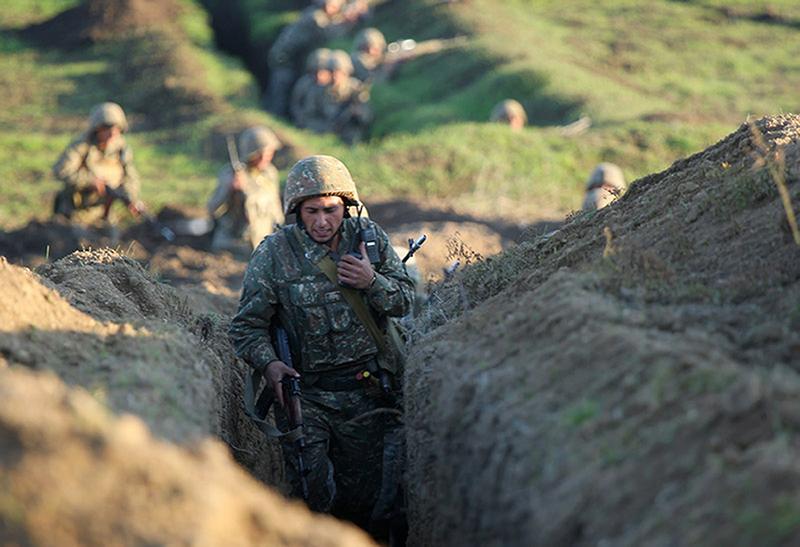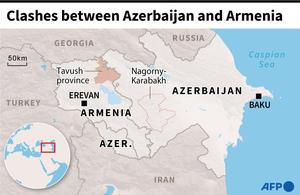 Armenian soldiers take their position on the front line in Tavush region, Armenia, Tuesday, July 14, 2020. Skirmishes on the volatile Armenia-Azerbaijan border escalated Tuesday, marking the most serious outbreak of hostilities between the neighbors since the fighting in 2016. (ARMENIAN DEFENSE MINISTRY PRESS SERVICE/ PANPHOTO VIA AP)
Armenian soldiers take their position on the front line in Tavush region, Armenia, Tuesday, July 14, 2020. Skirmishes on the volatile Armenia-Azerbaijan border escalated Tuesday, marking the most serious outbreak of hostilities between the neighbors since the fighting in 2016. (ARMENIAN DEFENSE MINISTRY PRESS SERVICE/ PANPHOTO VIA AP)
BAKU/YEREVAN - Seven Azeri soldiers and a civilian and four Armenian servicemen were killed on Tuesday in the third day of border clashes between countries that fought a war in the 1990s over the mountainous Nagorno-Karabakh region.
Azerbaijan and Armenia both said exchanges of fire that began on Sunday had continued into Tuesday, and each accused the other of ceasefire violations and shelling
The international community worries about clashes between Armenia and Azerbaijan in part because of the threat of instability in the South Caucasus, a region that serves as a corridor for pipelines taking oil and gas to world markets.
ALSO READ: Escalation fears after Caucasus foes clash on border
Azerbaijan and Armenia both said exchanges of fire that began on Sunday had continued into Tuesday, and each accused the other of ceasefire violations and shelling.
An army major-general and a colonel were among seven Azeri servicemen killed, Azeri deputy defense minister Kerem Veliyev said, adding: “Devastating blows were inflicted on the enemy.”
Armenia’s Defense Ministry said four of its servicemen, including a major and a captain, had been killed in skirmishes. Foreign Ministry spokeswoman Anna Naghdalyan said the city of Berd had been shelled near the border but Armenian forces had “destroyed the Azeri bases” that fired on it.
Armenia and Azerbaijan, two former Soviet republics, have long been in conflict over Azerbaijan’s breakaway, mainly ethnic Armenian region of Nagorno-Karabakh. But the latest clashes occurred around the Tavush region in northeast Armenia, some 300 km (190 miles) from the enclave.
ALSO READ: Ruling party retains majority in Azerbaijan's parliament
On Wednesday, baton-wielding riot police arrested dozens of people who broke into Azerbaijan’s parliament after marching through the capital Baku to show solidarity with the army following the latest clashes.
A Reuters witness said thousands of people took part in the march in Baku and there were demonstrations in other cities despite coronavirus restrictions which ban large gatherings in the South Caucasus country.
Demonstrators entered the parliament building in Baku as emotions intensified after the march. Their action did not appear to be intended as a protest against the authorities.
Russia urged the two sides to cease fire and show restraint, and Kremlin spokesman Dmitry Peskov told reporters Moscow was ready to act as a mediator.
NATO called on Azerbaijan and Armenia to take all necessary measures to prevent further escalation, according to James Appathurai, the US-led alliance’s special representative for the Caucasus and Central Asia.

President Tayyip Erdogan said Turkey would stand against any attack on Azerbaijan, with which it has strong historical and cultural ties and is involved in joint energy projects.
“It is our binding duty to mobilize all our political, diplomatic, social relations in our region and our world in this direction,” he told a news conference.
READ MORE: Azerbaijan's Aliyev wins 7-year term on top of 15 served
Ethnic Armenians in Nagorno-Karabakh declared independence in the enclave during a conflict that broke out as the Soviet Union collapsed in 1991.
Though a ceasefire was agreed in 1994, Azerbaijan and Armenia continue to accuse each other of shooting attacks around Nagorno-Karabakh and along the separate Azeri-Armenian frontier.


